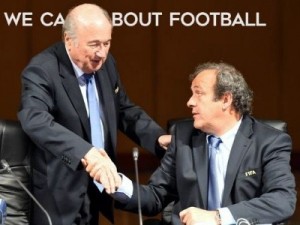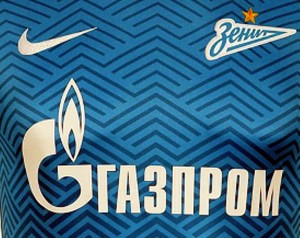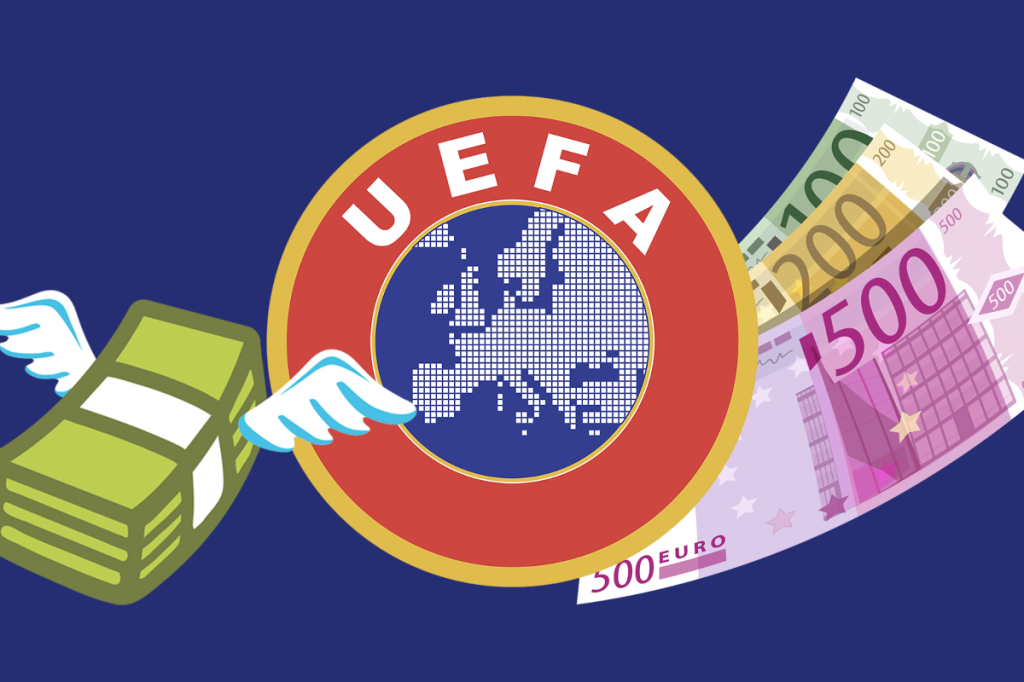By Evets Yelsdrab, March 2020
On the 14th February 2020 UEFA announced it had banned Manchester City  from its competitions for 2 seasons and fined them €30 million, this almost a year after the UEFA investigatory chamber had finalised an investigation which had commenced in March 2019.
from its competitions for 2 seasons and fined them €30 million, this almost a year after the UEFA investigatory chamber had finalised an investigation which had commenced in March 2019.
The investigation revisited a previous Financial Fair Play (FFP) case against City, this some 6 years after it had been settled and after Manchester City had fully complied with all sanctions as had been required. UEFA revisited the case after the German newspaper Der Spiegel published allegedly leaked, stolen and hacked emails purporting that in 2014 City had provided UEFA with financial reports showing sponsorship funds, which were allegedly indirect investments by City’s owners.
UEFA found City guilty of falsely inflating sponsorship revenues when making submissions as part of the Financial Fair Play (FFP) compliance process. UEFA also charged City with breaching UEFA regulations, this for failing to co-operate in the investigation as conducted by UEFA’s Club Financial Control Body (CFCB). Manchester City emphatically denied both charges and will appeal against them. The appeal will be heard in the Court of Arbitration for Sport (CAS) at a date yet to be determined. It looks like boiling down to:
a) Can UEFA prove any of the sponsorship money City declared was not sponsorship money, but actually a cash injection from the Club’s owners?
b) Can City prove they did fully co-operate with the UEFA Club Financial Control Body, or were willing to, but were denied the opportunity to do so?
The CAS appeal is a hearing and not a trial and so the onus is on City to refute the allegations which brought the new charges. City will need to provide evidence to the CAS 3-person panel that the funds in question were received from sponsors. The matter is complicated regarding how UEFA’s evidence is believed to be stolen or hacked and so may not be admissible in CAS. However even though such evidence would not be admissible in the courts of most countries, there are apparently precedents for CAS having found stolen evidence admissible. The question of if the evidence has been misinterpreted by UEFA will need to be considered.
THE COURT OF ARBITRATION FOR SPORT
CAS acts as a court of final appeal for decisions taken by competent sports authorities. The enforcement of their decisions is determined in accordance with Swiss Law. The CAS appeal procedure is broad, it may review all the facts and law presented in the first instance, it can hold hearings to facilitate its decisions, it can issue a new decision to replace the original one, it can annul a decision and return the case to the sports-body or federation for further consideration, and parties may also arrive at a settlement during the proceedings.
As one might expect, CAS operates in a more transparent way than UEFA and the UEFA Club Financial Control Body. Importantly, the CAS appeal process may allow new evidence to be presented, and this could favour City who have said of UEFA’s new charges:
“The decision contains mistakes, misinterpretations and confusions fundamentally borne out of a basic lack of due process and there remain significant unresolved matters raised by Manchester City FC.”
City also believe they can demonstrate they were willing to fully co-operate with the UEFA CFCB as required, saying the CFCB referral ignored a comprehensive body of irrefutable evidence City provided. Prior to the appeal hearing, City will advise CAS of all the facts and legal arguments which support the appeal and will also provide all exhibits and specification of other evidence on which they intend to rely. The 3-man panel of the CAS may at any time seek to resolve the dispute by conciliation and a settlement may be reached at the consent of both parties.
THE CASE OF UEFA vs AC MILAN
A scenario of what City may now face can be taken from the very similar 2018 UEFA FFP case against AC Milan. Similar to the FFP judgement against City, the UEFA Club Financial Control Body found AC Milan had not complied with FFP break-even obligations during 2015/2016/2017.
UEFA imposed the tough sanction on AC Milan that they be banned from competing in UEFA Club competitions for 2 years, this in the seasons of 2018/19 and 2019/20. AC Milan appealed the UEFA ban to CAS, as has City. In the appeal process, CAS agreed with the UEFA finding that AC Milan had as alleged not met the required UEFA FFP break even obligations.
However CAS did not make a judgement and instead returned the case to UEFA, this so they might “consider the imposition of a more proportionate sanction”. In other words CAS found the UEFA sanctions against AC Milan to be too harsh and so provided UEFA with the opportunity to correct this. As one might have expected though, UEFA then played hard ball and “reassessed” the original FFP breaches by AC Milan, not only for 2015/ 2016/ 2017 but also 2018.
On this basis UEFA then revised their decision and amongst other things banned AC Milan for the 2 seasons of 2022/23 and 2023/24, this unless they were break even compliant by the 30th June 2021.AC Milan then also appealed this decision to CAS. To cut a long story short, legal proceedings were terminated when both parties eventually agreed that UEFA CFCB decisions be set aside and replaced by one mutually agreed to.
The ban on AC Milan competing in UEFA Europa League competition was reduced from 2 seasons to 1 (2019/20). UEFA and AC Milan each paid their own costs and the award was made public.
If City and UEFA do not arrive at a settlement during the appeal and CAS returns the case to UEFA, just as in the case against AC Milan, UEFA will review the decision against City. This may eventually result in a compromise settlement acceptable to both parties as with AC Milan.
Whereas such a settlement appears possible due to the massive potential consequences for both City and UEFA, it does appear however that as in the case of AC Milan, there is much legal wrangling ahead before any such settlement may be possible.
WHY DID UEFA REOPEN THE PREVIOUSLY SETTLED CASE AGAINST CITY?It seems strange that after 6 years UEFA decided to revisit the 2014 FFP settlement, this after City had complied with all sanctions and the case was long over and done with. It’s stranger still that UEFA wanted to reopen a case based on dubious evidence allegedly stolen and/or hacked, which came from a person named only as “John” of the Football Leaks website and then published in the German newspaper Der Spiegel.
In 2018 Der Spiegel was the subject of Europe’s biggest journalistic scandal in years. Staff reporters were found to have been fabricatingd facts and falsifying stories for years. Even Der Spiegel said the scandal: “raises questions about internal structures here that must be addressed immediately”.
On this basis it could be inferred that UEFA did not need much prompting to reopen the 2014 FFP against City and perhaps had a predisposition to do so.
THE UEFA INVESTIGATIONS
On reaching the 2014 settlement UEFA had considered City’s breach of their FFP rules. This included the value and source of funds and sponsorships, including income from City’s commercial partners, City’s £350m sponsorship by Etihad Airways and other deals said to have contributed £47 million, these from image rights and intellectual property in 2012/13. The settlement agreement was made stating:
“Certain commercial partnerships were subject to examination. In order to avoid dispute and for the avoidance of doubt, Manchester City has agreed that for the period of the settlement it will not seek to improve the financial terms of two second tier commercial partnerships” UEFA also required “The compliance with the Settlement Agreement will be subject to on-going and in depth monitoring, in accordance with the applicable rules. In this connection, Manchester City also undertakes to provide the UEFA CFCB with a Progress Report evidencing its compliance with all relevant conditions agreed on a six monthly basis.”
It can be seen that the 2014 settlement was made on the basis that UEFA had thoroughly examined City’s funding and also their due diligence had been not only thorough but also ongoing, – all the way to 2015 when the sanctions expired.
examined City’s funding and also their due diligence had been not only thorough but also ongoing, – all the way to 2015 when the sanctions expired.
It cannot be refuted that City did their part in complying with all the UEFA sanctions, including a thorough examination of their finances and then “on-going and in depth monitoring”. The settlement between UEFA and City was then agreed upon by both parties. Yet 5 years later UEFA claimed they were no longer convinced that their own due diligence, ongoing scrutiny and examination of City’s finances had been adequate.
Rather than honoring the settlement as City had, UEFA reopened the case and then imposed additional and even harsher sanctions, including a 2 year ban. It seems remarkable not only that UEFA decided to reopen the original investigation, but that this was done on the basis of information received from dubious sources, via Der Spiegel, a German news agency “not afraid of the truth” but whose integrity has been severely questioned in recent times.
DUBIOUS INFORMATION FROM DUBIOUS SOURCES
Der Spiegel published allegedly stolen and hacked emails from the Football Leaks website, some purportedly from key staff Manchester City staff detailing how the Club would need to obtain additional sponsorship funding if they were to meet UEFA FFP requirements. City in response has said the emails were misinterpreted and do not confirm any wrongdoing. It is alleged the source of some emails was City’s own Information Technology system.
This is where it gets interesting, as the source of the allegedly stolen emails was only ever referred to as “John” of the Football Leaks website, it was claimed no computers were hacked to get them. However; “John” has been identified as Rui Pinto, who was originally charged with 147 criminal offences, including computer hacking, cybercrime and breach of postal secrecy laws.
Most of the crimes Pinto is accused of are related to the unauthorized accessing of confidential data. The most significant charge however concerns alleged extortion from the sports agency Doyen Sports. Portuguese prosecutors have said Pinto sought as much as €1 million from Doyen in return for deleting information belonging to them.
Pinto denies the extortion claims, he has been in prison since March 2019 awaiting trial. The number of charges against Pinto have been reduced to 90, which means he still faces the prospect of up to 30 more years in prison if found guilty. It has been reported after being told City had been banned by UEFA Pinto asked “Why only two years?” and then “Why didn’t UEFA call me? It seems remarkable UEFA has apparently never actually made contact with the source of the evidence they believe justified reopening the 2014 FFP case against Manchester City.
No matter how UEFA may claim the 2020 charges against City are “new”, it can be seen City has been tried twice for the same offence, the second time on the basis of UEFA having received, this many years later, allegedly stolen and hacked information from dubious sources.
It must also be considered how in contrast, Manchester City’s financials always have and continue to be independently audited by a highly reputable accounting firm and are made available to the general public in City’s Annual Reports. Manchester City has said “The club’s published accounts are full and complete and a matter of legal and regulatory record.”
WHY DID CITY ACCEPT THE 2014 UEFA SANCTIONS?
In 2014 UEFA decided to punish City by combining sporting sanctions with a large financial penalty and also placed many onerous future conditions on City, which in reality any club would have found extremely difficult to comply with. The UEFA sanctions were designed not only to make future seasons difficult for City financially, but also to hit hard on the football pitch.
In addition to the heavy fine, other sanctions included restriction on squad sizes and player wages. City accepted the sanctions but claimed the Club was innocent and had actually complied with the UEFA FFP rules. City explained they had reluctantly decided to accept UEFA’s sanctions in order to provide certainty for the future, which would allow them to move on.
The UEFA sanctions against City were extremely onerous, so much so that one might expect UEFA may have designed and delivered them with the expectation they would be virtually impossible to meet. The sanctions were many, including a €60 million fine, a reduction in the number of player’s City could have in their Champions League squad, this to be reduced from the 25 allowed for all other clubs to just 21.
might expect UEFA may have designed and delivered them with the expectation they would be virtually impossible to meet. The sanctions were many, including a €60 million fine, a reduction in the number of player’s City could have in their Champions League squad, this to be reduced from the 25 allowed for all other clubs to just 21.
To make it even more difficult 8 of those 21 City players would need to qualify as being “homegrown”. The sanctions did not end there, City were also forced to commit to posting a financial loss of no more than €20 million in 2014 and just to make it more difficult UEFA demanded this loss must again be halved to just €10 million in 2015. Enough is enough, one might expect, but not for UEFA, who imposed even more sanctions on City, including a cap on player wages, which had to remain at current levels, not just for 1, but 2 seasons.
Yes there’s more, City also had to agree to limit spending in the transfer market, again not for just 1, but 2 seasons. Never before had UEFA imposed so many and such onerous sanctions on any Club, sanctions designed to affect Club performance both on and off the football field.
City rightly expected should they somehow miraculously be able to comply with all of the many onerous and broadly based sanctions, then UEFA would be equally ethical in meeting their part of the bargain, this ensuring the UEFA FFP case against City would not only be brought to a conclusion, but also never revisited.
WHERE DID CITY GO WRONG?
A big mistake by City was as explained in the previous paragraph, in that they assumed UEFA would be ethical in meeting their part of the bargain, this in ensuring the settled FFP case had been brought to a final conclusion never to be revisited.
Although City accepted all of the UEFA sanctions acknowledging they had combined losses of £150m during the two seasons under consideration (2011-12 and 2012-13), they had argued they should have been judged to have passed UEFA’s FFP test.
This because there was “a fundamental disagreement” regarding how the UEFA FFP rules for players bought before June 2010 were interpreted. The disagreement concerned how UEFA FFP supposedly allowed for wages on contracts to be discounted, yet UEFA then determined this was only for the one season of 2011-12.
City advised they believed they had complied with the FFP regulations, but then reluctantly accepted the onerous UEFA FFP sanctions, saying
“At the heart of discussions is a fundamental disagreement between the club’s and UEFA’s respective interpretations of the FFP regulations on players purchased before 2010”.
City went on to say “In normal circumstances the club would wish to pursue its case and present its position through every avenue of recourse. However, our decision to do so must be balanced against the practical realities for our fans, for our partners and in the interests of the commercial operations of the club.” City had accepted all of the UEFA sanctions on the expectation if complied with they would be lifted, and then at the end of the 2015-16 season the FFP case against City would be settled, never to be revisited.
City did meet all their obligations and complied with all the UEFA restrictions and conditions. City were even reimbursed €40 million of the €60 million UEFA fine for having done so, the case was over and done with, or so City might have thought.
City then went on to become a profitable self-sustaining football club and has broken even or made a profit in each of the last five years, which is verified in Manchester City’s financials, which are released every year after having been independently audited by a reputable accounting firm.
Furthermore even though City is a club belonging to a privately owned business, its financial reports are published in its Annual Reports which are readily available to the general public. City certainly fulfilled their part of the bargain, why then would UEFA want to impose further FFP sanctions on a club which did all that was requested of them?
It appears however City did not obtain an unconditional settlement, one with no recourse if they were to meet all the conditions and sanctions required by UEFA. City appear to have relied upon the goodwill of UEFA, an organisation whose credibility has never been the best and has become increasingly questionable.
FFP BUT NOT FOR UEFA
Although UEFA are the self-appointed European football police and demand “ethical” behaviour and good financial management from the football clubs which they allow to play in their competitions, UEFA itself can be seen as not always meeting the strict ethical and/or financial standards they demand of others. UEFA’s credibility deserved to be questioned when they appointed Jean-Luc Dehaene, to introduce and manage FFP.
Dehaene had previously been in charge of the Dexia Bank, which in 2008 had to be bailed out by Belgian and French taxpayers to the tune of more than €6 Billion and was only rescued when taken over by the Belgian Government. How could UEFA believe such a person should be put in charge of their FFP?
Why did UEFA an organisation which then had a trend of financial losses insist on acting as the financial regulator and police of European football? What made UEFA believe it was qualified, experienced and had the credibility to interfere with football club’s finances by introducing and then “managing” a system of FFP?
FFP – PROTECTOR OF THE UEFA FOOTBALL FAMILY
When proposing FFP the then UEFA President Michel Platini said:
“There have always been clubs that are richer than others and there doubtless always will be. All we want is for clubs – richer and poorer alike – to spend no more than they earn and to balance their books, this being the only sure way for them to survive.”
The above statement by Platini appears to demonstrate how he failed or did not want to appreciate how FFP would prevent owners of clubs like Manchester City from making investments which would ensure their clubs remained debt free.
Platini also apparently failed to appreciate how UEFA’s FFP would allow the owners of UEFA “football family” Clubs like Manchester United to go further into debt, this year after year, as they take money out, rather than put money into their clubs.
When elected as President of UEFA in 2016 the Slovenian Lawyer, Aleksander Ceferin pledged to strengthen the UEFA financial fair play measures put in place in 2009. UEFA proudly claimed due to their FFP, European football clubs reported €600 million in profits in 2017, this compared to the €1,700 million combined losses in 2011, it’s not only a bit rich for UEFA to be taking all the credit for clubs profitability, but they also seem to have lost sight of how European football under FFP is drowning in a sea of debt.
When it comes to debt, UEFA might be seen to have rounded up the mice but let the elephants roam free. The reality is FFP is far from the financial panacea UEFA promotes it as. €600 million in profits for European football clubs pails into significance considering just one club has more debt than the annual profits of all clubs combined.
The truth is where debt is concerned UEFA FFP has actually been bad for football, very bad. By UEFA’s own figures some of Europe’s star clubs have massive debt, yet UEFA chase down City, a club which has very little debt. The UEFA league debt table as of January 2020 is: 1) Manchester United (€568m), 2) Tottenham Hotspur (€483m), 3) Inter Milan(€461m), 4) Atletico Madrid (€384m), 5) Juventus (€372m), 6) Fenerbahce (€334m), 7) AS Roma (€312m), 8) Valencia (€274m), 9) AC Milan (€260m).
As can be seen, 2 big elephants are not even mentioned, the Spanish Club’s Real Madrid and Barcelona, what their debts might be if it hadn’t been for state aid doesn’t bear thinking about.
It can be seen the top 5 Clubs (excluding Real Madrid and Barcelona) have debts of €2,268 million, yet all European clubs combined made a profit of €600 million in 2017, this is hardly something for UEFA to brag about. In 2019 Barcelona were reported to have increased gross debt to €880m after buying Antoine Griezmann for €120m from Atletico Madrid, he was the third most expensive signing in football history. Although it’s apparent UEFA are highly concerned that Manchester City should not spend too much on players, their approach to Spanish Clubs appears very different. For example; when Barcelona splashed the cash on Griezmann they were applauded by UEFA for doing so.
UEFA’s official statement saying:
“France’s golden boy Antoine Griezmann has joined Barcelona on a five-year deal after ending his five-year spell at Atlético; UEFA.com polishes our shrine in his honour.”
This is the hypocrisy of UEFA’s FFP at its finest, their FFP doesn’t take a clubs gross debt into consideration. Barcelona and Real Madrid built their success on debt incurred before the introduction of FFP is UEFA’s claim, fair enough perhaps, but does this make it acceptable that those debts are not only not paid off, but in some cases are allowed to increase year after year under FFP?
This seems very much at odds with Platini’s justification when introducing FFP saying: “All we want is for clubs – richer and poorer alike – to spend no more than they earn and to balance their books, this being the only sure way for them to survive.”
Of course UEFA appear to have overlooked that Manchester City is not in any danger of going broke and in fact due to excellent financial management and business practice is now a profitable and self-sustainable football club. It’s interesting to compare City’s financial performance over the last seven years compared to UEFA’s, which the graphs below help illustrate:
One might think UEFA would be better to concentrate on manging football competitions, this rather than a system of FFP, which should perhaps be managed by an organisation that specialises in finance and at understands the importance of debt in relation to profitability. UEFA need also consider there is no other industry which allows an external association to regulate financial performance by turning a blind eye to debt whilst at the same time restricting owners from investing in their own businesses.
FOOTBALL GOES DEEPER INTO DEBT UNDER UEFA FFP
UEFA FFP operates on the principle so long as a club’s revenues are large enough to cover repayments on debt, then debt is not a problem. Whereas in most cases this may be true, the anomaly however with FFP and good financial management, is there’s no requirement for a Club to pay off any of their debt and indeed under FFP it’s actually OK to go deeper into debt.
This is akin to having a very large mortgage on a house, you have a good job though and earn enough to make the monthly mortgage payments. However at the end of the year you take back all of the mortgage payments and borrow some additional money too, which is all added onto the mortgage.
At the end of the year you have not reduced, but increased the size of your mortgage, the actual equity you have in the home has actually decreased. In other words although your earnings are enough to pay the mortgage, you go deeper into debt. This is not really responsible financial management as the next year you are at greater financial risk.
Should circumstances change in the coming years, for example if interest rates increase, property values or your personal income decrease, or some unforeseen payments need to be made, then serious financial trouble may lie ahead. Corona Virus?
Allowing football Clubs to not pay off or to go deeper into debt is not good for the game, this no matter how loud UEFA may wish to shout about their FFP having improved the financial health of football.
The reality is under UEFA FFP football net debt has increased 25% from £6.2 billion to £7.8 billion, a massive problem which sees money being taken out of, rather than being put into the game and which is being fuelled by UEFA’s FFP focusing on short term profitability rather than ever increasing debt.
When you consider if FFP was to include debt the likes of Manchester United, Real Madrid, Barcelona would not pass the test, you can perhaps see why UEFA designed their FFP system so that astonishingly debt would not be a consideration of a football club’s financial health.
Yet absurdly UEFA FFP not only encourages debt but at the same time limits owners from investing into clubs, a business financial model unknown in any other industry due to its anti-competitive nature and which if challenged in court is likely to be found illegal. One can only hope Manchester City will do the football world a favour and take on UEFA and FFP and bring an end to its anti-competitive format.
Manchester City’s owners are financially responsible, they do not operate by gearing up the clubs debt every year. Yet they are forbidden under FFP to invest in their own club, as FFP demands they must not spend more than they earn, this even though they desire to spend their own money, not money they have borrowed, or for which they have mortgaged club assets against.
gearing up the clubs debt every year. Yet they are forbidden under FFP to invest in their own club, as FFP demands they must not spend more than they earn, this even though they desire to spend their own money, not money they have borrowed, or for which they have mortgaged club assets against.
In 2016 Real Madrid won the European Champions League, this the same year the European Commission ordered both Real Madrid and Barcelona to repay millions of euros to the Spanish Government. Three separate investigations into the relationship between Spanish football clubs and the state, found the two biggest clubs in La Liga had received “favourable treatment”, which was in violation of the EU rules for state aid. The European commissioner in charge of competition policy, said:
“Using taxpayers’ money to finance professional football clubs can create unfair competition. Professional football is a commercial activity with significant money involved, and public money must comply with fair competition rules. The subsidies we investigated in these cases did not.
UEFA apparently had thought this to be OK for some clubs, but not others outside of Spain. It must be mentioned however the General Court of the European Union overturned the decision that Real Madrid had received €18.4 million in illegal state aid in a transaction involving municipal land. All the same, much of Real Madrid’s funding whether deemed illegal or not, did not come from earnings or sponsorship, which apparently UEFA were willing to overlook.
It can be seen UEFA FFP operates in one way for some clubs and differently for others. It also seem astonishing that in 2017 La Liga, the Spanish football governing body, had the audacity to demand that UEFA open investigations regarding possible breaches of Financial Fair Play (FFP) by Manchester City and Paris Saint-Germain.
It’s also difficult to believe Platini did not know the type of FFP he was proposing would protect Clubs like Real Madrid and Barcelona from new competition, this from clubs like Manchester City, whose owners were willing to invest in their clubs, rather than use them as cash cows.
This is perhaps explained when on the 23rd May 2014 Platini as UEFA President proudly said the move to impose financial fair play sanctions against Manchester City was a historic moment for football. Platini told Sky Sports News:
“The people at Manchester City are not happy, the people of PSG, they are not happy, but I think Manchester United, Everton, they are happy. It’s very subjective. We have to follow the regulations but I think it’s an historical moment and a good moment for football. My wish is not to kill the clubs. We have fair play to help the clubs have better governance”.
It’s hard to deny Platini’s claim FFP is “very subjective”, but anything most else he says appears highly questionable.
DO AS WE SAY, NOT AS WE DO
After having introducing FFP supposedly to ensure football clubs would be “ethical” and not spend more than they earned, Platini as the former UEFA President was banned from football for ethics violations. Swiss prosecutors accused the then FIFA President Sepp Blatter of having made a “disloyal payment” of £1.6 million to Platini, who in response claimed the payment was for “legitimate consultancy work” with FIFA.
A small problem for Platini however was he had received the payment in 2011, some 9 years after his initial payment for work with FIFA had been made. Also the payment was coincidentally made to Platini by Blatter just 3 months before Blatter was re-elected at FIFA President. Both Platini and Blatter were placed under formal investigation by FIFA’s independent ethics committee in September 2015.
The FIFA ethics committee said Platini
“did not show commitment to an ethical attitude and lacked respect for laws and regulations”,
this said of the man who had been so keen to enforce ethics and fair play on football clubs with FFP. Platini and Blatter were both found guilty of ethics violations and banned from football for 8 years.
FIFA’s appeals committee reduced the ban to 6 years and Platini’s ban was further reduced to 4, this after an appeal to the CAS. But wait, there’s more, in 2019 Platini was arrested in relation to the awarding of the 2022 World Cup to Qatar, who he is known to have voted for.
Platini’s legal representatives said: “He has done absolutely nothing wrong and affirms he is totally unrelated to the facts which are unknown to him.” Platini insisted on his innocence stating he has been the victim of a conspiracy to prevent him from becoming FIFA president saying:
“I’ll come back. I do not know where, I do not know how, but I cannot stay on a suspension, even if it’s a suspension made by morons.”
Platini also said
“I never felt suspended, how can a private company suspend someone from football?”
Which is a question Manchester City might well ask of UEFA, along with how is it UEFA demands football clubs wanting to play in its competitions must meet financial and ethical standards which their own senior personnel do not meet?
UEFA FFP LOOKS THE OTHER WAY
Whereas UEFA were keen to enforce strict FFP on City, they seemed to be far  more lenient when it came to Russian Clubs. The Football Leaks website “The Black Sea”, alleges they reviewed documentary evidence showing in the 5 years since the introduction of UEFA FFP, the Russian state has via fake sponsorship deals injected over €1.65 billion into Russian football clubs Zenit, Lokomotiv and Dynamo, they allege the practice still continues.
more lenient when it came to Russian Clubs. The Football Leaks website “The Black Sea”, alleges they reviewed documentary evidence showing in the 5 years since the introduction of UEFA FFP, the Russian state has via fake sponsorship deals injected over €1.65 billion into Russian football clubs Zenit, Lokomotiv and Dynamo, they allege the practice still continues.
Zenit is one of the most successful Clubs in the Russian Premier League, it plays at the Gazprom Stadium in Saint Petersburg, no surprise as Zenit is owned by Gazprom, Russia’s state energy company.
Gazprom has revenues of over €100 billion pa, providing Zenit with near-limitless funding, which no doubt helped them win the Russian Premier League title in 2009/10, 2010/11, 2011/12, 2014/15 and 2018/19, Zenit also won the EUFA Cup in 2007/08 and the UEFA Super Cup in 2008. In 2012 Gazprom funded Zenit to the tune of some €113 million, a significant breach of UEFA FFP rules.
In 2013 Zenit attempted to justify the massive funding from their owners advising without it they could not pay their players enough, would be forced to sell players which would reduce their competitiveness, including in UEFA competitions. Zenit inferred compliance with FFP would have a negative effect on Russian football as a whole which would likely peak in 2018, this on the eve of the World Cup, which was to be held in Russia.
In May 2014 UEFA settled the case against Zenit with an agreement little more than a slap on the wrist for the wealthy Club, a €12 million fine, squad reduction to 22 and 2 year player salary restrictions and no exclusion from UEFA competitions. In the same month UEFA found City guilty of breaching UEFA FFP regulations and they were hit with a fine effectively 5 times greater.
Other sanctions on City included a reduction in City’s Champions League squad from 25 to just 21 players, 8 of which had to be English “homegrown”. City also had to agree to financial losses of no more than €20m in 2014 and then just €10m in 2015. There was also a 2 year cap on player wages and strict limits placed on spending in the transfer market for the next 2 seasons. UEFA Financial Fair Play it seems is fairer for some, than it is for others.
THE BAND PLAYS ON
Not much appears to have changed at UEFA, in February 2020 UEFA executive committee member and PSG President Nasser Al-Khelaifi was charged in connection with a bribery investigation, this less than a week after UEFA had banned Manchester City from its European competitions, after having reopened the previously settled 2014 FFP case.
The Swiss Attorney General’s office announced Al-Khelaifi had been charged with inciting former FIFA Secretary General Jerome Valcke to commit criminal mismanagement in relation to the awarding of media rights for FIFA tournaments. The 3 year probe has seen Valcke accused of accepting bribes in return for television rights, including staying rent-free at an Italian villa bought by UEFA’s Al-Khelaifi, who is also chairman of the BeIN media group.
It was said this allowed Valcke to avoid paying up to £1.5million in rent, an amount he failed to disclose. UEFA claimed no knowledge of Al-Khelafi’s activities.
UEFA’s MOVING GOAL POSTS
City’s impending CAS appeal will be about defending the 2 UEFA charges made  against them and not the overriding issue of is UEFA FFP actually fair or even legal. Manchester City though do appear entitled to claim the original UEFA case against them only held water partly because UEFA moved the goalposts in 2013, this regarding how FFP considered remuneration for players signed before 2010.
against them and not the overriding issue of is UEFA FFP actually fair or even legal. Manchester City though do appear entitled to claim the original UEFA case against them only held water partly because UEFA moved the goalposts in 2013, this regarding how FFP considered remuneration for players signed before 2010.
UEFA appeared to suggest any FFP losses attributable to player contacts undertaken prior to the 1st June 2010 would be favourably treated in FFP calculations, this providing: “It [the Club] reports a positive trend in the annual break-even results (proving it has implemented a concrete strategy for future compliance)”.
One might believe in reality this was not a concession at all, because did UEFA really have the authority to hand out sanctions to Clubs for meeting contractual obligations made prior to the introduction of FFP? However; in 2013 UEFA advised of a different interpretation regarding the way player payments attributable to contracts signed prior to 2010 were to be treated.
The changes meant although City had always believed they had met UEFA FFP requirements, UEFA could now due to their own ambiguity claim City had not done so. Would it be cynical in assuming UEFA’s change of approach to financial hangovers resulting from player contracts signed prior to 2010 actually helped engineer City’s non-compliance?
Whatever the CAS outcome, City may still want to take on UEFA regarding not only if FFP is fair, but importantly if it is even legal. It has been said UEFA’s FFP restrictions on investment are not actually enforceable, as they are anti-competitive and a restriction of trade, this in part because business owners cannot be restricted in the amount they desire to invest in companies they part or fully own.
The anti-competitive and restriction of trade arguments are unlikely to be considered in City’s CAS appeal, but may however at a later date be pursued by City in the Swiss Supreme Court and/or the European Court of Human Rights, something UEFA will surely dread.
IS UEFA FIT TO MANAGE FFP?
Most football supporters would agree there is a need for a genuine and responsible FFP system. When a football player can earn in 1 week what it takes the average man in the street 20 years to earn, when clubs like Manchester United are allowed to go deeper into debt year after year because their owners take money out of their club and the game of football, then something surely has to change to ensure clubs remain viable.
UEFA had the opportunity to implement a FFP system that could have helped reduce debt and at the same time level the playing field in a way which was fair to all clubs. UEFA however instead chose to introduce a bogus FFP system, one hiding under the guise of preventing clubs from going into debt by spending more than they earn, but which was selective, allowing some clubs to receive hundreds of millions of Euros in non-sponsorship funding, yet at the same time preventing others from receiving the same.
The harsh reality is UEFA FFP is a stinker, it restricts investment, encourages debt which places many clubs in a precarious position should their financial circumstances change, it ensures selected clubs in UEFA’s “football family” are protected from competition and ensures “new money”
Clubs do not get to join the elite UEFA family. No matter what the result of the CAS decision, one can only hope Manchester City will do the football world a favour by challenging UEFA’s FFP and in doing so put an end to a football protection racket, a racket which has been allowed to not very convincingly masquerade as system supposedly promoting financial fair play.
THE END GAME
It appears somewhat ironic Manchester City now find themselves facing additional charges for alleged FFP offences from a UEFA case harking back to 2014, one which may not have actually been enforceable by law.
It’s even more ironic that having met all the requirements of the original UEFA FFP settlement, City were tried once again and handed even stricter sanctions.
The final irony surely being the additional charges against City were made based upon dubious evidence, from dubious sources, by an organisation that itself may be seen as having dubious credibility. The 3-man CAS Panel therefore has a lot to consider, much of which appears to favour Manchester City.
When considering the harshness of the UEFA sanctions and the massive implications and consequences for both UEFA and City, the CAS may well remit the case back to UEFA, this requiring them to “consider the imposition of a more proportionate sanction”, which means they reluctantly will have to review the sanctions against City, including the 2-year ban. UEFA may in fact be hoping the CAS does remit the case back to them, so they can continue to play their game of hard ball as they first did with AC Milan.
This because if the CAS does find in favour of City then the competency of UEFA President Ceferin and his 18 member Executive Committee will be left in tatters, UEFA’s credibility when determining and imposing FFP sanctions will have been found highly questionable, as will it’s integrity and so perhaps any entitlement to remain as the governing body of European football.
On the other hand, for Manchester City a 2-year ban from Europe would not only be financially debilitating, but may also open the door for Premier League FFP investigations and sanctions.
The stakes could not be higher and so perhaps both parties are now hoping the CAS will remit the case back to UEFA, this so after much legal wrangling, an agreement acceptable to both can be hammered out. If so both parties will be looking for an agreement which might leave them each with little more than a black-eye, rather than risk being knocked out for the count.
One must hope if such an agreement is reached, then both parties will be ethical enough to abide by it, this so it won’t resurface again in another 6 years-time, or whenever UEFA may want to have another dig at City, their owners or indeed any other club willing to invest in their own business and football to achieve success.

